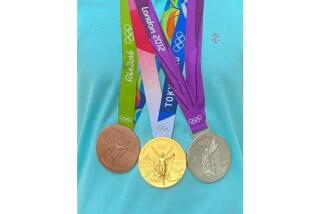Transfusion Bags Found in House
- Share via
House cleaners found used blood transfusion bags at a home where Austrian Nordic skiers stayed during the Winter Olympics.
International Olympic Committee President Jacques Rogge opened an investigation Thursday into the find, ordering that “all scientific techniques” be used, “including DNA testing.”
The bags were found Wednesday along with blood transfusion sets, including tubes and needles. Wasatch County Sheriff Mike Spano gathered the evidence and turned it over to doping control officials for the Salt Lake Organizing Committee.
Spano said the transfusion bags were drained of all but residual blood, indicating they had been used.
“I didn’t monkey with it,” Spano said. “I had gloves on, we stuffed it in a large bag, I washed my hands of it and immediately turned it over to SLOC. They are so up on this doping.”
The home in Midway, Utah, near the Olympic Nordic venue at Soldier Hollow, had been rented to the Austrian team, which kept 10 athletes there.
Doping officials will analyze blood residue for any sign they contained banned substances.
Dr. Charles Rich, SLOC’s chief medical officer and a member of the IOC medical commission, said he found it difficult to believe the Austrians had any legitimate medical reasons for using blood transfusions during the Olympics, “where oxygen-carrying capacity is so important” to winning.
Rich said if it was doping, technicians could test the DNA of residual blood to implicate athletes who could be stripped of any medals they won.
The Austrians took home three Olympic medals in Nordic events at Soldier Hollow.
Christian Hoffmann won a silver and Mikhail Botvinov a bronze in the 30-kilometer race, while Wolfgang Perner won a bronze in the 10-kilometer biathlon sprint.
Spain’s Johann Muehlegg was stripped of his gold medal in the 50-kilometer race after testing positive for darbepoetin, which boosts production of oxygen-carrying red blood cells.
*
Kim Un-yong, a South Korean IOC member plagued by scandals and a speed skating controversy at the Olympics, offered to resign as head of the country’s sports governing body.
Kim abruptly offered to resign during a meeting of delegates of the Korea Sports Council, said Park Pil-soon, a council spokesman.
Kim also offered to resign as head of South Korea’s Olympic Committee, then left the conference room, Park said.
The delegates met without Kim and “unanimously” decided to ask Kim to complete his five-year term that ends in February 2005, Park said.
Kim has yet to decide whether to accept, Park said. The spokesman said earlier that Kim accepted the request.
“Chairman Kim returned to the meeting and thanked delegates for the request, which made us believe that he was accepting the request. But as the situation stands now, his offer to resign still stands,” Park said. “He will make his final position known in a day or so.”
There was no comment from Kim on the episode.
The 70-year-old Kim has been plagued by scandals involving him and his family.
Prosecutors are investigating a case in which Kim’s son, John, reportedly received bribes from a jailed taekwondo official accused of fixing taekwondo tournaments.
Before the scandal surfaced, Kim resigned as head of the South Korean Taekwondo Association in November. Kim still heads the World Taekwondo Federation.
Kim is also under public criticism for failing to take a firmer stand on the controversial disqualification of South Korean short track skater Kim Dong-sung at the Olympics.
Kim Dong-sung crossed the line first in the 1,500 meters, but was disqualified for impeding the course of American Apolo Anton Ohno, who was awarded the gold.
South Korea’s Olympic delegation first threatened to boycott the closing ceremony in protest. Kim Un-yong reversed that decision.
More to Read
Go beyond the scoreboard
Get the latest on L.A.'s teams in the daily Sports Report newsletter.
You may occasionally receive promotional content from the Los Angeles Times.






